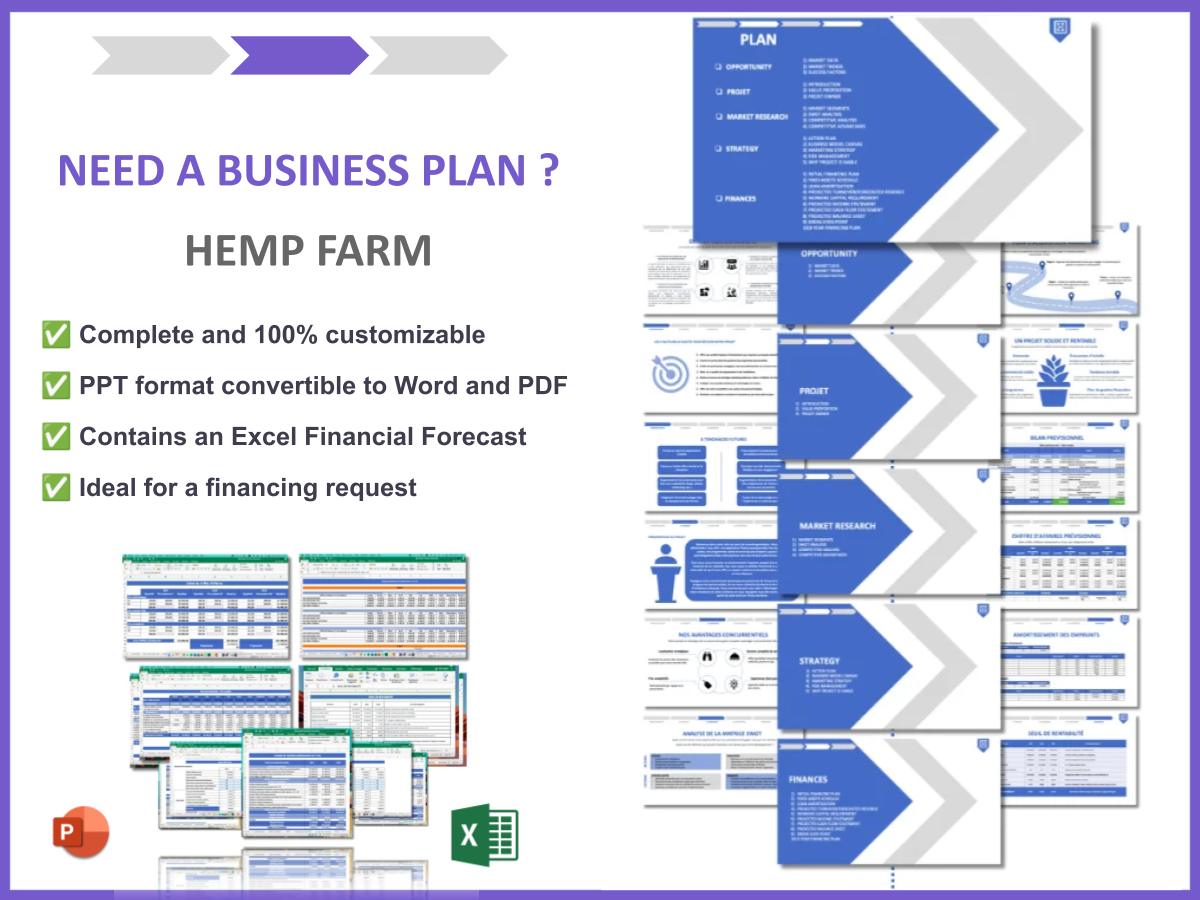Why Should You Have a SWOT Analysis for Your Hemp Farm?
Are you thinking about starting a hemp farm? You’re not alone! The hemp industry is booming, and many entrepreneurs are diving in. But before you plant those seeds, have you considered conducting a Hemp Farm SWOT Analysis? This analysis can be a game-changer for your business strategy. Did you know that over 60% of new farms fail within the first five years? A solid SWOT analysis can help you avoid being part of that statistic.
A SWOT analysis, which stands for Strengths, Weaknesses, Opportunities, and Threats, provides a structured way to evaluate your business environment and make informed decisions. Let’s break down why this is essential for your hemp farm.
- Understand your strengths to leverage them.
- Identify weaknesses to mitigate risks.
- Discover opportunities for growth.
- Anticipate threats to stay ahead of competitors.
- Make data-driven decisions for sustainability.
- Improve your marketing strategies.
- Enhance operational efficiency.
- Align your business goals with market trends.
- Foster resilience against industry changes.
- Create a roadmap for future success.
How Do You Write a SWOT Analysis for Your Hemp Farm?
Creating a SWOT analysis for your hemp farm is a straightforward process, but it requires careful thought. Here’s how you can do it effectively:
Strengths
Your farm’s unique growing conditions, like soil quality or climate, can be a significant strength. Established relationships with suppliers and customers provide a competitive edge. Experienced staff can enhance productivity and product quality. Innovative farming techniques can set your farm apart.
Weaknesses
Limited access to capital can restrict growth potential. Lack of experience in the hemp industry may hinder operational efficiency. Inadequate marketing strategies can result in lower sales. Vulnerability to pests and diseases can threaten crop yield.
Opportunities
The growing demand for hemp products presents significant market opportunities. Potential partnerships with local businesses can expand your reach. Government grants and subsidies for hemp farmers can provide financial support. The rise of e-commerce opens new sales channels.
Threats
Regulatory changes can impact your farming practices and profitability. Competition from other hemp farms can reduce market share. Economic downturns can affect consumer spending on hemp products. Climate change poses risks to crop yield and quality.
SWOT Example N°1 for Hemp Farm
Let’s take a look at a hypothetical example of a hemp farm in Oregon that focuses on CBD production.
| SWOT | Analysis |
|---|---|
| Strengths | High-quality soil and climate ideal for hemp growth. |
| Weaknesses | Limited marketing presence. |
| Opportunities | Increased interest in natural health products. |
| Threats | New regulations on CBD sales. |
- Strong local demand for CBD.
- Established supply chain for raw materials.
- Limited brand recognition.
- Regulatory uncertainty in the CBD market.
This example highlights the potential for success while also emphasizing the importance of addressing weaknesses and threats. By investing in marketing, the farm can leverage its strengths to capture more market share.
SWOT Example N°2 for Hemp Farm
Now, consider a hemp farm in Colorado that produces textiles and biofuels.
| SWOT | Analysis |
|---|---|
| Strengths | Diverse product offerings. |
| Weaknesses | High production costs. |
| Opportunities | Growing eco-conscious consumer base. |
| Threats | Fluctuating market prices for raw materials. |
- Wide range of applications for hemp products.
- Potential for innovation in sustainable textiles.
- Higher costs compared to synthetic alternatives.
- Market volatility can affect profitability.
This farm's diverse product range is a significant strength, allowing it to tap into multiple markets. However, keeping production costs low is crucial to remain competitive.
SWOT Example N°3 for Hemp Farm
Let’s analyze a hemp farm in California that focuses on nutritional supplements.
| SWOT | Analysis |
|---|---|
| Strengths | Strong brand reputation in the health sector. |
| Weaknesses | Dependence on a single product line. |
| Opportunities | Expansion into international markets. |
| Threats | Increased competition from established brands. |
- Established customer loyalty.
- Potential for product diversification.
- Risk of market saturation.
- Competitive pricing from larger companies.
This example illustrates the importance of brand reputation in driving sales. However, the farm must consider diversifying its product offerings to mitigate risks associated with dependence on a single line.
SWOT Example N°4 for Hemp Farm
Next, let’s look at a small family-run hemp farm in Kentucky.
| SWOT | Analysis |
|---|---|
| Strengths | Family-owned with a loyal customer base. |
| Weaknesses | Limited resources for expansion. |
| Opportunities | Community-supported agriculture initiatives. |
| Threats | Local competition from larger farms. |
- Strong community ties and support.
- Unique family brand story.
- Limited marketing reach.
- Price competition from larger operations.
This farm's family-owned status is a strength, creating a personal connection with customers. Yet, they need to enhance their marketing efforts to compete effectively.
SWOT Example N°5 for Hemp Farm
Consider a tech-savvy hemp farm in Washington that utilizes precision agriculture.
| SWOT | Analysis |
|---|---|
| Strengths | Advanced technology for efficient farming. |
| Weaknesses | High initial investment costs. |
| Opportunities | Growing interest in sustainable farming practices. |
| Threats | Rapid technological changes. |
- Efficient resource management.
- Potential for higher yields.
- Significant upfront costs.
- Need to keep pace with tech advancements.
This farm's use of technology gives it a competitive advantage. However, the high costs associated with advanced farming methods require careful financial planning.
SWOT Example N°6 for Hemp Farm
Let’s examine a cooperative hemp farm in Vermont.
| SWOT | Analysis |
|---|---|
| Strengths | Collective bargaining power. |
| Weaknesses | Coordination challenges among members. |
| Opportunities | Shared resources for marketing and distribution. |
| Threats | Conflicts between member interests. |
- Economies of scale in production.
- Diverse expertise among members.
- Potential for miscommunication.
- Varied goals among members.
The cooperative model provides strength in numbers, allowing for better pricing. However, effective communication and coordination are essential for success.
SWOT Example N°7 for Hemp Farm
Now, consider a hemp farm in Maine focused on organic production.
| SWOT | Analysis |
|---|---|
| Strengths | Certified organic status. |
| Weaknesses | Higher production costs. |
| Opportunities | Rising demand for organic products. |
| Threats | Certification costs and regulations. |
- Strong market for organic hemp.
- Premium pricing for organic products.
- Costs associated with maintaining certification.
- Competition from non-organic producers.
Being certified organic is a major selling point, but the farm must manage the associated costs carefully to maintain profitability.
SWOT Example N°8 for Hemp Farm
Let’s analyze a hemp farm in North Carolina that focuses on hemp seed production.
| SWOT | Analysis |
|---|---|
| Strengths | Specialization in high-quality seeds. |
| Weaknesses | Niche market limits growth potential. |
| Opportunities | Expanding interest in hemp seed products. |
| Threats | Price fluctuations in the seed market. |
- High demand for quality seeds.
- Potential for niche marketing.
- Limited market size.
- Volatile pricing affecting profit margins.
Focusing on seed production allows for specialization, but the farm must navigate the challenges of a limited market.
SWOT Example N°9 for Hemp Farm
Consider a hemp farm in Illinois that produces hemp oil.
| SWOT | Analysis |
|---|---|
| Strengths | Expertise in oil extraction. |
| Weaknesses | Limited distribution network. |
| Opportunities | Growing interest in hemp oil for wellness. |
| Threats | Increasing competition in the oil market. |
- Strong product knowledge.
- Opportunity for online sales growth.
- Need for better distribution strategies.
- Price pressure from competitors.
The farm's expertise in oil extraction is a strong asset, but expanding distribution is crucial for reaching a broader customer base.
SWOT Example N°10 for Hemp Farm
Finally, let’s look at a hemp farm in South Dakota focused on hemp fiber production.
| SWOT | Analysis |
|---|---|
| Strengths | Established relationships with manufacturers. |
| Weaknesses | Dependence on a few key clients. |
| Opportunities | Growing textile industry interest in hemp. |
| Threats | Economic downturn affecting textile demand. |
- Strong B2B relationships.
- Opportunity to diversify client base.
- Risk of losing major clients.
- Economic factors influencing demand.
Strong relationships with manufacturers can drive sales, but the farm must work to diversify its client base to mitigate risks.
Key Takeaways and Next Steps
In summary, conducting a Hemp Farm SWOT Analysis is a crucial step for any farmer looking to succeed in this competitive industry. By understanding your strengths, weaknesses, opportunities, and threats, you can make informed decisions that will set your hemp farm up for success. Don’t wait—start your SWOT analysis today and position your hemp farm for growth!
If you’re looking for guidance on creating a solid foundation for your business, check out this Hemp Farm Business Plan template. It’s designed to help you outline your strategy effectively.
Additionally, you can explore our articles on How to Develop a Hemp Farm? and How to Build a Hemp Farm Marketing Plan? With Example for more insights and practical tips.
Frequently Asked Questions
1. What is a SWOT analysis?
A SWOT analysis is a strategic tool that helps identify the strengths, weaknesses, opportunities, and threats related to a business.
2. Why is a SWOT analysis important for hemp farms?
It assists farmers in understanding their competitive position and making informed decisions for growth and sustainability in the hemp industry.
3. How often should I conduct a SWOT analysis?
It’s advisable to perform a SWOT analysis annually or whenever significant changes occur in your market or business operations.
4. What are some strengths of a hemp farm?
Strengths may include unique growing conditions, established customer relationships, and innovative farming techniques.
5. What weaknesses might a hemp farm face?
Common weaknesses can include limited access to capital, lack of experience, and inadequate marketing strategies.
6. What opportunities exist in the hemp market?
Opportunities may include increasing consumer demand for hemp products, potential partnerships, and government support for hemp farmers.
7. What threats should hemp farmers be aware of?
Threats can include regulatory changes, competition, and market volatility affecting profitability.
8. Can a SWOT analysis help with marketing strategies?
Yes, it provides insights into leveraging strengths and opportunities to enhance marketing efforts for your hemp farm.
9. How do I start my own SWOT analysis?
Begin by brainstorming each of the four components: strengths, weaknesses, opportunities, and threats related to your hemp farm.
10. Are there tools to help with SWOT analysis?
Yes, many templates and software tools are available online to assist in conducting a SWOT analysis.







